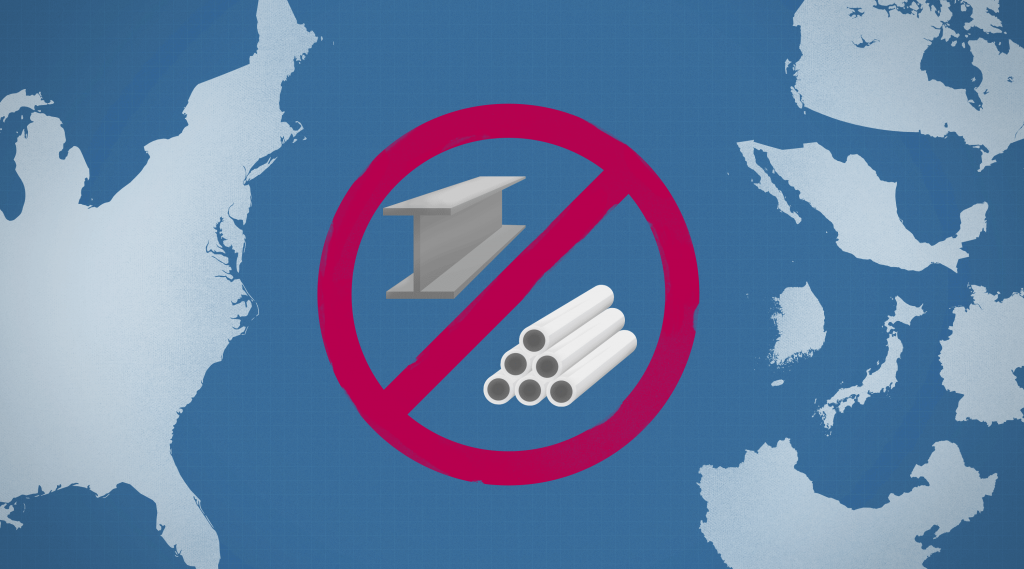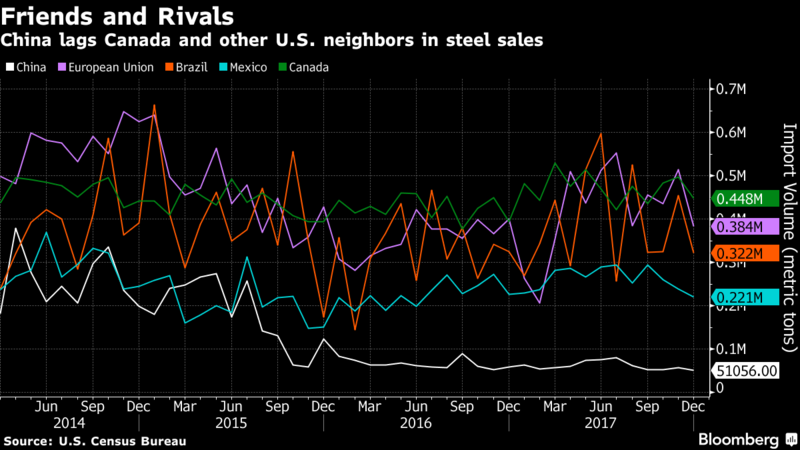- GOLD IRA
- Download Our 2024 Precious Metals IRA Investor’s Guide.
Click Here  Gold IRA
Gold IRA
 Investing
Investing
-
- CRYPTO IRA
- PRICES & STATS
- RETIREMENT PLANS
- BLOG
 Questions? Call (888) 820 1042
Questions? Call (888) 820 1042
First Round of Trade War Opens with American Tariffs
Disclosure: Our content does not constitute financial advice. Speak to your financial advisor. We may earn money from companies reviewed. Learn more
Last Updated on: 5th March 2018, 12:41 pm

This past week you saw months of rumbling about threatened U.S. trade barriers finally materialize. American President Donald Trump proposed heavy duties on both steel and aluminum. The trade barriers are to be set at 25 percent on steel and 10 percent on aluminum. The president has promised that the order will be signed and go into effect this week.
Retaliation in kind has already been promised by long time American allies in Europe. The prospect of a trade war threatens U.S. and global trade and prosperity. Markets already were roiled for several days on the potential fallout.
It reminds you of why you should consider IRA-approved gold for your retirement portfolio. Gold makes sense in an IRA because it protects against market turbulence. Today is a good time to look into Gold IRA rollover rules and regulations.
U.S. President Imposes Tariffs Sparking Global Anger
A big story of the impending tariffs centers on the fact that no one will be exempt from them. Analysts had hoped that U.S. trading allies in Canada, Australia, Japan, and the European Union might be granted an exception. Yet the president ruled this out over the weekend. He also dared other nations to carry out their retaliation threats on Friday, calling trade wars good:
“When a country (USA) is losing many billions of dollars on trade with virtually every country it does business with, trade wars are good, and easy to win.”
The president's argument is that this will present American companies with a level playing field that has been unfair for years. Trump claimed it will enable U.S. companies to expand operations and bring on more workers. The president has been promising such a move since his election campaign. He used a legal provision for protecting national security as the basis for the tariffs.
The chart below shows the countries with the highest steel sales to the U.S. who will be most impacted:

Anger against the new tariffs that the President claimed will last for “a long period of time” has erupted from trading partners around the world. Reactions from Canada and the EU, to Japan, to China have been strong and swift. It is leading to the very real possibility of a retaliatory set of actions against American company exports that threatens greater costs for American consumers and businesses. This is happening against a backdrop of increasing central bank tightening around the globe.
Retaliation Already Threatened by EU
Canada and the European Union have reacted most powerfully to the tariffs so far. The Canadians are the largest international suppliers of both aluminum and steel for the United States. They called the new trade policy unacceptable. The European Union promised it will “react firmly.” Both are promising to wield countermeasures that the World Trade Organization approves in short order.
The EU is already threatening a response against specific iconic U.S. exports to the 27 member nation block. President Jean-Claude Juncker of the European Commission stated that the group will forcefully retaliate. They plan to go after European imports of famous American brands including Harley-Davidson motorcycles, Kentucky bourbon whiskey, and Levi Strauss company jeans.
The powerful threats from Juncker have already increased the likelihood of a global trade war. Both the International Monetary Fund and the World Trade Organization have weighed in on the subject. The IMF cautioned that such trade restrictions will probably harm both the world and U.S. economies. The WTO called the possibility for tensions to continue escalating real.
Trump responded to EU threats of retaliation forcefully with his Saturday tweet:
“If the EU wants to further increase their already massive tariffs and barriers on U.S. companies doing business there, we will simply apply a tax on their cars which freely pour into the U.S.”
It is not hard to see why U.S. and global markets' volatility and losses have reappeared last week.
Japanese Argue Against Threat to National Security Basis
Japan's response to the promised tariffs has been more subdued. They were baffled at the argument that importing steel or aluminum from long-time U.S. ally Japan could represent a serious threat to America's national security. Japanese Trade Minister Hiroshige Seko shared his thoughts Friday in Tokyo with reporters:
“Steel and aluminium imports from Japan, which is an ally, do not affect U.S. national security at all. I would like to convey that to the U.S. when I have an opportunity.”
Japan is a significant supplier of steel to world markets, though it is not among the largest several exporters to the U.S.
Chinese Reaction to Tariffs Mixed
The Chinese reaction to the new tariffs has been mixed. Spokeswoman Hua Chunying of the Foreign Ministry declared China's wish for the United States to abide by trade rules. This is ironic considering the Chinese have been widely accused of flooding world markets with steel at lower than production cost prices. China's steel exports to the U.S. are a mere fraction of American imports though.
Yet Chinese participants in the industry had more provocative comments. Vice Chairman of China Iron and Steel Association Li Xinchuange labeled the decision as “stupid.” Vice Chairman Wen Xianjun from the China Nonferrous Metals Industry Association argued that these policies will:
“Overturn the international trade order. Other countries, including China, will take relevant retaliatory measures.”
Analysts have warned that imposing tariffs against China could easily lead to similar moves in response. Beijing has already begun its own investigation into their American imports of sorghum. They are also considering limited U.S. soybean imports and shipments.
Additional American Set Tariffs to Follow
This first salvo in the potential trade war is not the only one President Trump is contemplating. Today he tweeted about further trade actions to come. The U.S. leader called these reciprocal taxes. He considers these to be a legitimate means of raising U.S. imports duties to comparable levels that other countries assess on American goods entering their own nations. President Trump promised in his tweet:
“We will soon be starting RECIPROCAL TAXES so that we will charge the same thing as they charge us. $800 billion trade deficit-have no choice.”
One of the industries the president is contemplating is the European car manufacturing sector. Such a move would especially outrage manufacturing and exporting powerhouse Germany, as well as upsetting France, Britain, and Italy.
Some American Companies to Be Negatively Impacted
The flip side to the international impact of such tariffs is that they also will harm some American companies directly. Those firms that utilize aluminum and steel may suffer from potential shortages and higher prices. This includes corporations ranging from chocolate manufacturer Hershey Co., to soft drink makers Coca Cola, Pepsi Co, and Dr. Pepper Snapple, to beer maker MillerCoors.
All of these firms employ aluminum in their production and packaging processes, claiming their operations would suffer from these tariffs. The MillerCoors spokesman tweeted:
“We buy as much domestic can sheet aluminum as is available, however, there simply isn't enough supply to satisfy the demands of American beverage makers like us.”
Gold Offers Protection Against the Fallout of a Trade War
The impending trade war is another argument for adding IRA-approved metals to your investment and retirement portfolios. The uncertainty that such trade retaliations create can also threaten financial markets. Gold hedges against both scenarios as it has for thousands of years. There are a variety of Gold IRA storage options for precious metals in your retirement portfolio today. Consider this list of the top five gold coins for investors.



 Silver
Silver Gold
Gold Platinum
Platinum Palladium
Palladium Bitcoin
Bitcoin Ethereum
Ethereum

 Gold: $2,387.15
Gold: $2,387.15
 Silver: $27.92
Silver: $27.92
 Platinum: $931.02
Platinum: $931.02
 Palladium: $903.43
Palladium: $903.43
 Bitcoin: $67,910.26
Bitcoin: $67,910.26
 Ethereum: $3,278.81
Ethereum: $3,278.81